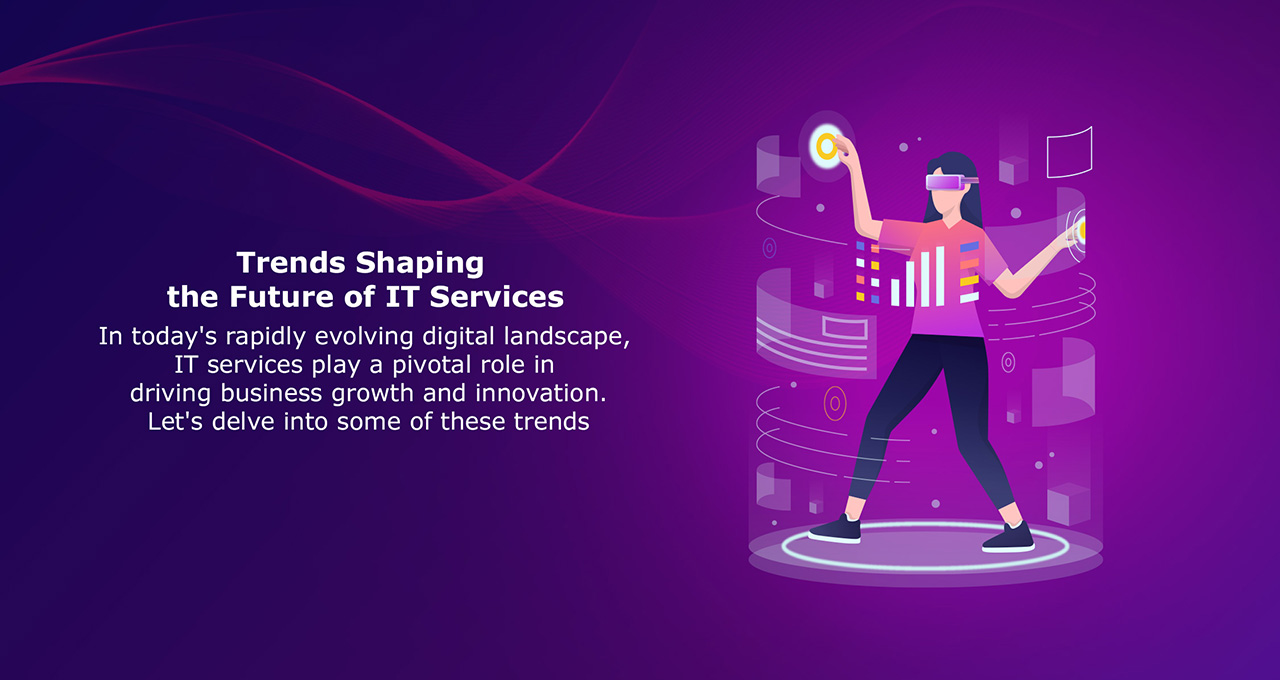
Image Credit: Image by Freepik
In today’s rapidly evolving digital landscape, IT services play a pivotal role in driving business growth and innovation. As businesses continue to embrace digital transformation, several key trends are shaping the future of IT services, offering new opportunities and challenges for organizations worldwide. Let’s delve into some of these trends:
1. Cloud Computing Revolution:
Cloud computing has revolutionized the way businesses operate by offering scalable, flexible, and cost-effective solutions. With the adoption of cloud platforms such as AWS, Azure, and Google Cloud, organizations can leverage global business IT solutions to enhance agility and streamline operations.
2. Artificial Intelligence (AI) and Machine Learning (ML):
AI and ML technologies are transforming IT services by automating tasks, predicting outcomes, and improving decision-making processes. From chatbots for customer support to predictive analytics for business insights, AI and ML are driving efficiency and innovation across industries.
3. Cybersecurity and Data Privacy:
With the increasing volume of data generated and shared, cybersecurity and data privacy have become paramount concerns for businesses. Implementing robust security measures, such as encryption, multi-factor authentication, and threat detection systems, is essential to safeguarding global IT networks and ensuring regulatory compliance.
4. Internet of Things (IoT) Integration:
The proliferation of IoT devices is creating new opportunities for IT services, enabling real-time data monitoring, predictive maintenance, and enhanced customer experiences. By integrating IoT technologies into their infrastructure, businesses can improve operational efficiency and drive innovation.
5. Edge Computing:
Edge computing is gaining traction as organizations seek to process data closer to its source, reducing latency and improving performance for critical applications. This trend is particularly relevant for industries such as healthcare, manufacturing, and finance, where real-time data processing is essential.
6. Blockchain Technology:
Blockchain technology is revolutionizing digital transactions by providing secure, transparent, and tamper-proof solutions. From supply chain management to financial transactions, blockchain has the potential to transform global business IT solutions, enhancing trust and efficiency.
7. Remote Work and Collaboration Tools:
The shift towards remote work has accelerated the adoption of collaboration tools such as video conferencing, project management platforms, and virtual private networks (VPNs). IT services play a crucial role in enabling seamless remote work environments and ensuring data security across distributed teams.
8. 5G Connectivity:
The rollout of 5G networks is set to revolutionize connectivity, enabling faster speeds, lower latency, and greater bandwidth for data-intensive applications. IT services providers are exploring new opportunities to leverage 5G technology for enhanced user experiences and innovative solutions.
9. Sustainable IT Practices:
Sustainability is becoming increasingly important in IT services, with organizations focusing on energy efficiency, waste reduction, and carbon footprint management. Adopting green IT practices not only reduces environmental impact but also contributes to cost savings and brand reputation.
10. Hybrid IT Infrastructure:
Hybrid IT environments, combining on-premises infrastructure with cloud solutions, are gaining popularity due to their flexibility and scalability. IT services providers are offering hybrid solutions that optimize performance, security, and cost-effectiveness for modern businesses.
In conclusion, the future of IT services is characterized by innovation, agility, and a strong focus on delivering value to businesses and customers. By embracing these key trends and leveraging global business IT solutions, organizations can stay ahead of the curve and drive sustainable growth in the digital era.
FAQs – Trends Shaping the Future of IT Services:
Global Business IT Solutions refer to comprehensive IT services and technologies that cater to businesses operating on a global scale. These solutions encompass cloud computing, cybersecurity, AI and ML, IoT integration, and other innovative technologies aimed at enhancing operational efficiency and driving business growth worldwide.
Cloud computing solutions offer global businesses scalability, flexibility, and cost-effectiveness by providing on-demand access to computing resources and services. This enables organizations to scale their IT infrastructure according to business needs, collaborate across geographies, and optimize resource utilization for enhanced productivity.
AI and ML technologies are revolutionizing IT services by automating tasks, predicting patterns and trends, and improving decision-making processes. These technologies enable businesses to harness the power of data, personalize customer experiences, and drive innovation through intelligent automation and predictive analytics.
Cybersecurity is crucial in global IT solutions to protect sensitive data, mitigate cyber threats, and ensure regulatory compliance across international markets. Robust cybersecurity measures, including encryption, authentication mechanisms, and continuous monitoring, are essential to safeguarding global IT networks and maintaining trust among stakeholders.
Integrating IoT technologies allows organizations to monitor, analyze, and act on real-time data from interconnected devices and sensors worldwide. This enables predictive maintenance, operational efficiency improvements, and data-driven decision-making, leading to enhanced customer experiences and competitive advantage in the global market.
Blockchain technology offers secure and transparent solutions for digital transactions, supply chain management, and data integrity verification on a global scale. By adopting blockchain-based solutions, businesses can enhance trust, reduce fraud, and streamline processes in cross-border transactions and supply chain operations.
Sustainable IT practices involve optimizing energy consumption, reducing waste, and minimizing environmental impact in IT operations globally. Key considerations include adopting energy-efficient technologies, promoting recycling and reuse of IT equipment, and implementing eco-friendly data center strategies to support sustainable business growth.
Hybrid IT infrastructures combine on-premises resources with cloud services, offering flexibility, scalability, and agility for global enterprises. This approach allows organizations to leverage the benefits of both on-premises and cloud environments, optimize costs, and meet varying business demands across different regions and markets.
5G connectivity provides faster speeds, lower latency, and greater bandwidth for data-intensive applications and services in global IT environments. This enables real-time communication, enhanced user experiences, and innovation in areas such as IoT, remote work, and multimedia content delivery, driving digital transformation on a global scale.
To stay competitive, businesses need to embrace innovation, adopt agile practices, and invest in transformative technologies such as AI, cloud computing, and cybersecurity. Partnering with experienced global business IT solutions providers can also help organizations navigate complex challenges, accelerate digital transformation, and achieve sustainable growth in today’s dynamic IT landscape.

